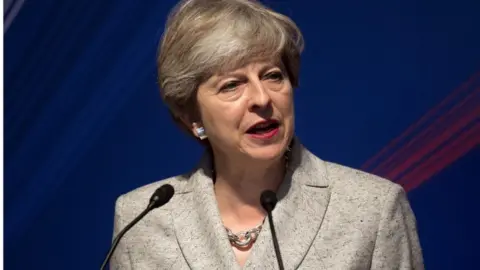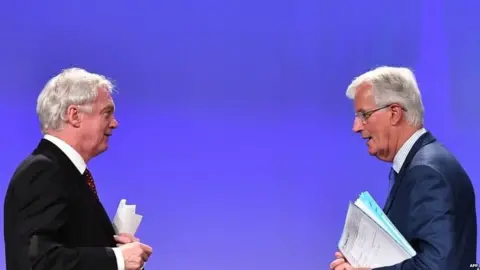Brexit: Theresa May wants to intensify pace of talks
 PA
PABritain is ready to "intensify" Brexit talks with the European Union rather than stick to the one-week-a-month schedule, Downing Street has said.
Brexit Secretary David Davis has just concluded a week of talks in Brussels about the UK's withdrawal from the EU.
EU officials say progress is short of what is needed to move negotiations on to post-Brexit relations.
Theresa May's spokeswoman said the UK wanted to talk about future relations with the EU "as soon as we can".
Currently, negotiations about the UK's withdrawal from the EU - scheduled to take place in March 2019 - take place for a week every month. The UK would prefer a rolling series of meetings.
Mrs May's spokeswoman told political reporters: "We are ready to intensify negotiations. Nothing has been formally agreed, but that is something that we can discuss. Typically in negotiations, as time goes on, you see the pace pick up."
She did not repeat earlier claims that the UK was "confident" talks would move on to trade after the October EU summit.
On Sunday, Mr Davis dismissed newspaper reports the UK had secretly agreed to pay a "exit" figure of up to £50bn as "nonsense".
Mrs May's spokesman indicated that the UK would not come up with a figure until wider talks began, saying: "We are not there yet." But she suggested the divorce bill was "inextricably linked" to the UK's future relationship with the EU.
 AFP
AFPThe Downing Street comments came after the EU's Brexit negotiator, Michel Barnier, warned that Britain faced "extremely serious consequences" if it left the single market, which, he said, had not been explained to the British people.
Mrs May's spokeswoman said: "The British people have heard those arguments."
Meanwhile, on the day before MPs return to Westminster, Downing Street called for unity among its MPs as they prepare to debate the government's flagship Brexit bill.
The EU Withdrawal Bill will repeal the law that paved the way for the UK to join the European Economic Community in the 1970s and convert 40 years' worth of EU statutes into domestic law.
'Threat to sovereignty'
Chancellor Philip Hammond called on backbenchers seeking to "amend or delay" the bill not to "disrupt this vitally important piece of enabling legislation".
He added: "This piece of legislation is a vital enabler, giving the government the flexibility to deal with the changes that will have to be made as we leave the European Union."
But Labour said it will seek to amend the bill to stop the government from automatically accruing new powers after Brexit.
Labour shadow chancellor John McDonnell said: "We voted for the implementation of Article 50 because we respect the referendum result.
"But we cannot have this situation where government becomes unaccountable on the implementation of one of the most important decisions for a generation."
Tom Brake, the Liberal Democrat Brexit spokesman, said the bill "represents a major threat to the sovereignty of Parliament and no amount of tweaking and fiddling will make a silk purse of this sow's ear".
"The Liberal Democrats will fight to fix this bill - and if it is not changed, we will vote against it at second reading," he said.
The opposition is courting Europhile Conservative MPs, claiming its position on remaining in the single market and customs union during any Brexit transition is more "clear and coherent" than the Tories'.
Asked about possible difficulties for the bill, the Downing Street spokeswoman said the prime minister's focus "is on giving enough time to debate" the bill.
